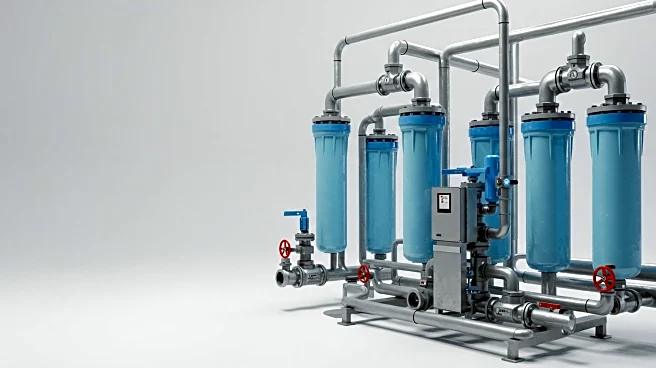What is the story about?
What's Happening?
The Water Infrastructure Modernization Act of 2025, introduced by Arizona Senator Ruben Gallego and co-sponsored by Utah Senator John Curtis, aims to amend the Federal Water Pollution Control Act to include intelligent water infrastructure technologies. The bill proposes increasing funding authorization from $25 million to $50 million annually and extending the program through 2028. The U.S. Environmental Protection Agency would oversee the grant program, which would fund engineering, design, construction, implementation, training, and operations related to intelligent water infrastructure technology. However, planning, feasibility studies, operation, and maintenance would remain ineligible for funding. The bill also mandates annual reports to Congress on funded projects, resiliency improvements, and recommendations, along with an initial report listing denied project applications and reasons for denial.
Why It's Important?
The introduction of the Water Infrastructure Modernization Act is significant as it addresses the growing need for advanced water management systems in the U.S. By focusing on intelligent water infrastructure technologies, the bill aims to improve the efficiency and resilience of water systems, potentially reducing operational costs and enhancing decision-making. This could lead to better water conservation and management practices, benefiting communities and the environment. The increased funding and extended program duration reflect a commitment to modernizing water infrastructure, which is crucial for adapting to climate change and ensuring sustainable water resources.
What's Next?
As the bill is currently in the 'introduced' stage, it will undergo further legislative scrutiny and debate. Stakeholders, including environmental groups, water management agencies, and technology providers, may engage in discussions to influence the bill's provisions. If passed, the implementation of intelligent water infrastructure technologies could lead to significant advancements in water management, potentially setting a precedent for future infrastructure projects. The requirement for annual reports to Congress will ensure accountability and transparency in the program's execution.
Beyond the Headlines
The focus on intelligent water infrastructure technologies highlights the increasing role of digital solutions in environmental management. The integration of AI, real-time monitoring, and predictive maintenance in water systems could transform traditional practices, leading to more sustainable and efficient operations. This shift may also drive innovation in related sectors, such as data analytics and environmental engineering, fostering new opportunities for growth and development.














